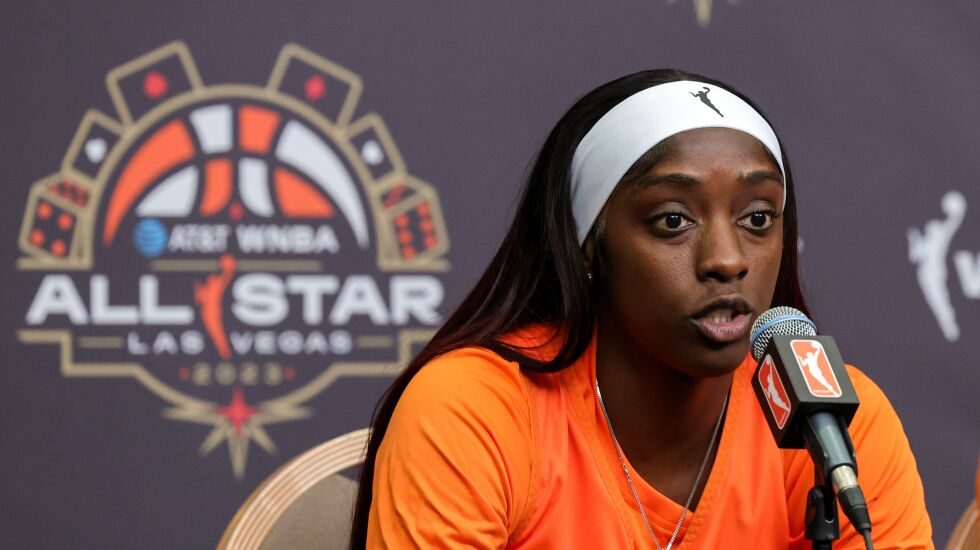
LAS VEGAS — Sky star Kahleah Copper’s three-point celebration hasn’t changed, but the frequency with which she uses it has.
For Copper, a three-time WNBA All-Star, there might be no greater feeling than turning to face an opponent’s bench after she hears their players mutter, ‘‘That’s off,’’ with her arm raised and her hand curled to display three fingers.
There’s another level to it, too. Every time Copper celebrates making a three-pointer, it’s a moment to acknowledge that she can score at all three levels.
Copper’s third All-Star nod — this one without a supporting cast of Hall of Fame players, under the pressure of double-teams and in a new system — has shown nothing is going to prevent Copper from ‘‘getting hers.’’
‘‘Nothing can stop me,’’ Copper said before scoring 16 points on 7-for-12 shooting in Team Stewart’s 143-127 victory Saturday against Team Wilson in the All-Star Game. ‘‘There’s nothing that’s going to hold me back from getting the things that I really want. Adversity is a real thing, but to not put your head down or quit says a lot.’’
Copper knew entering this season that she had to make changes to her game. Without Sky all-time assists leader Courtney Vandersloot, all-time points leader Allie Quigley and two-time WNBA MVP Candace Parker on the team, she understood that the ease with which she previously had gotten to the rim would be gone.
After an offseason in Philadelphia with player-development coach Chaz Franklin, Copper turned to trusted adviser Jeff Pagliocca, Vandersloot’s development coach, to help her make adjustments.
During the first half of the season, Copper’s field-goal percentage at the rim has dropped from 63.7% in 2022 to 51.1%, but her three-point percentage has risen from 35.6% to 41.9%.
‘‘It’s hard to substitute the playmaking we had with Vandersloot, Parker and Emma Meesseman,’’ Pagliocca said. ‘‘So it was imperative that Kah was prepared to handle a little bit more assertively.’’
Pagliocca hasn’t really needed to change much of Copper’s game. Their work has been focused on bringing forth skills she always had but hadn’t needed to use.
After Pagliocca took a look at Copper’s mechanics, their first few workouts were spent sharpening her shot. Copper’s biggest weapon always has been her downhill attack and speed. But without a slew of other playmakers alongside her, opponents have had an easier time taking those away.
The shift in Copper’s game also has stemmed from the Sky’s ball movement as a result of not having a true point guard, such as Vandersloot, running sets. When the offense is running successfully, the ball is moving fast and players are attacking close-outs to put defenses at a disadvantage.
As a result, Copper is finding more opportunities playing off the catch, as opposed to getting the ball on the move for an easy lay-in.
‘‘She has a lot of weapons,’’ Pagliocca said. ‘‘She’s fiercely competitive, and you take that before anything. You take a player that works that way and is wired that way because the rest is easy if they are workers.’’
Beyond Copper’s production, she has made mental adjustments, too. She has gone from being the player behind the veterans to the veteran guiding a new group through injuries and a midseason coaching/general manager change.
‘‘If anyone is built for [the adversity the Sky have faced], it’s Kah,’’ Vandersloot said.
When Copper returns from the All-Star break, she will look to guide the Sky out of a three-game losing streak. The Sky are clinging to the eighth and final playoff spot in the 12-team league, and their ability to secure a spot in the postseason will depend on Copper maintaining her All-Star level of play.
‘‘This season, to do what I’m doing and be an All-Star is just another testament to who I am,’’ Copper said.







